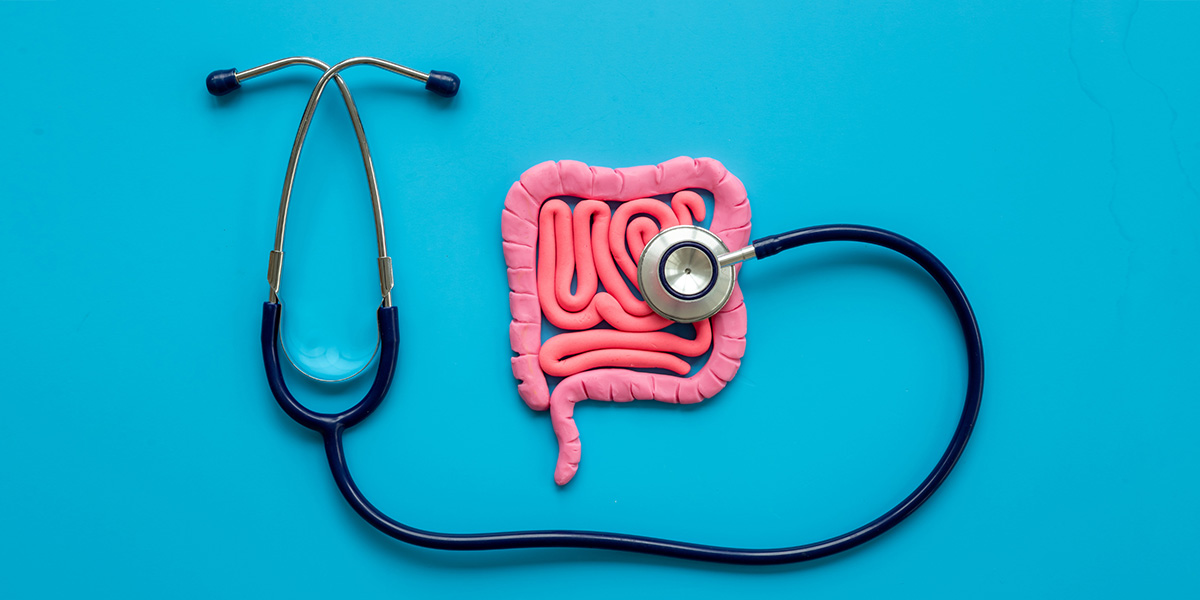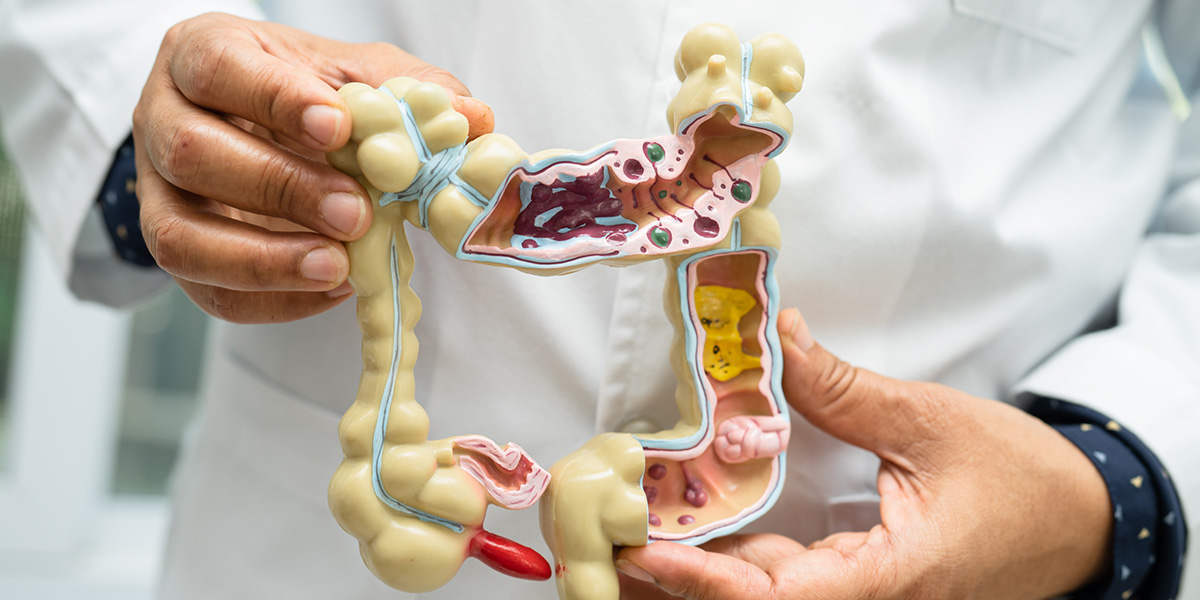
The Relationship Between Gut Health and Menstrual Cycles: What You Should Know
Did you know that your gut health and hormonal balance are closely interconnected? It’s true. If you are dealing with an irregular menstrual cycle, severe PMS, or painful periods, you may need to improve your gut microbiome balance to regain your menstrual health.
Sounds complicated, right? It doesn’t have to be. We’ll break it down so you understand the potential link between hormonal imbalance, painful periods, PMS, irregular periods, and gut health. We’ll even share our top tips to improve your gut health, hormonal health, and period experience naturally.
Importance of Gut Health
The term “gut” refers to your digestive tract, or gastrointestinal (GI) system. This includes your stomach, intestines, and colon. This is where your body digests and absorbs nutrients and collects waste to be removed through bowel movements and urine.
Your gut is also home to trillions of microbes that work together to break down food and turn it into nutrients your body can use for energy and repair. While some of these bacteria are good for your health, others are harmful. Good and bad bacteria have to be in balance. You want more of the beneficial bacteria than the harmful ones.
If you have too many bad bacteria, you can experience gut microbiome imbalance or gut dysbiosis which can lead to chronic inflammation, gut health issues, autoimmunity, and all kinds of chronic health issues.
Your gut is connected to your entire body. It affects your immune system, brain health, hormonal health, endocrine system, skin health, and more. Problems in your gut may increase your risk of all kinds of issues, including gut problems, hormonal issues, immune system imbalances, autoimmunity, skin issues, sleep issues, mental health problems, and more (1, 2, 3, 4, 5, 6).
Understanding the Menstrual Cycle
Out of these issues, we will specifically talk about the menstrual cycle and how poor gut health can be linked to PMS, menstrual pain, and irregular periods. Before we get into this, let’s define the menstrual cycle.
The menstrual cycle is a natural monthly process driven by hormonal changes in the female body. Its goal is to prepare the female body for a possible pregnancy. If pregnancy doesn’t happen, the body also sheds unnecessary tissue during menstruation. It starts on average around the age of 12, during puberty, and lasts until menopause, generally between age 50 and 55.
Each cycle is about 28 days though there are some variations between women or even month to month. Each menstrual cycle has four stages: the follicular stage, ovulation, the luteal stage, and menstruation (7, 8).
Follicular Phase
The follicular phase is behind right after the end of menstruation and before ovulation. On average, it lasts about 16 days, though it may take anywhere from 11 to 27 days. During this time, the hypothalamus prompts the pituitary gland to release follicle-stimulating hormone (FSH), which then triggers the ovaries to make small follicles with immature eggs. One, and on rare occasions, two eggs mature during one follicular phase, getting ready for pregnancy. During this time, the uterine lining also thickens in preparation for a possible pregnancy.
Ovulation
Ovulation occurs at the end of the follicular phase. Estrogen levels increase which causes the release of luteinizing hormones (LH). LH is responsible for ovulation, which is when mature eggs are released from the ovary down the fallopian tube to the uterus, getting ready to be fertilized by a sperm. Ovulation lasts between 12 to 48 hours. If there is no pregnancy, the unfertilized mature egg will die and dissolve.
Luteal Phase
At the end of the follicular phase, the egg turns into something called corpus luteum. It releases a significant amount of progesterone and some estrogen, which helps the fertilized egg to implant. If pregnancy occurs during ovulation, the body will begin making chorionic gonadotropin (hCG), which keeps the corpus luteum healthy and supports the early stages of pregnancy.
If pregnancy doesn’t occur during ovulation, estrogen and progesterone levels drop, the corpus luteum will shrivel and reabsorb, and the body gets ready for menstruation. During this time, you may experience premenstrual syndrome (PMS), including bloating, cramping, breast tenderness, headaches, cravings, weight gain, and mood changes.
Menstruation
Menstruation is the stage we also call the period. If pregnancy doesn’t occur, estrogen and progesterone levels will decrease and the body will release the uterine lining, unwanted tissues, blood, and mucus. A menstrual period may last anywhere between 3 to 7 days, however, there are variations between women.
You may experience cramps, bloating, mood swings, and other symptoms during your period, especially during the first few days. If your symptoms are severe, if your period is shorter or longer than usual, or if you are experiencing irregular periods, something may be off.
The Connection Between Gut Health and Hormonal Balance
While many things can impact your hormonal balance and your menstrual cycle, including stress, your exercise levels, the food you eat, health issues, and so on, your gut health may be one of the factors we may need to look at. Your gut health can impact your menstrual cycle. Let’s look at the connection between hormonal balance, irregular periods, and gut health.
Your gut microbiome and your endocrine system are deeply connected which can affect your hormonal balance. Your gut microbiota supports the production and metabolism of hormones, including cortisol, serotonin, and estrogen. For example, some gut bacteria play a role in estrobolome, which is a collection of bacteria in the gut that can in metabolize and modulate circulating estrogen and impact hormonal equilibrium (9, 10, 11).
Gut microbiome imbalance can impact hormonal balance, which can increase the risk of irregular menstrual cycle, PMS, hormonal disorders, metabolic issues, and mood disorders.
The Gut Microbiome’s Role in Hormone Regulation

Before we get into the connection between irregular periods and gut health and what to do about it, we want to discuss your gut flora’s role in hormone regulation.
Gut Microbiome and Estrogen Levels
Research has shown that the gut microbiome may impact female health (12). Your gut microbiome plays a key role in the regulation of estrogen in your body. It does this through estrobolome, which, as you know, is a group of gut bacteria that makes enzymes that metabolize estrogen (13, 14). These enzymes are responsible for regulating how much estrogen get reabsorbed into your bloodstream and how much gets excreted.
Gut microbiome imbalances can lead to too high or too low levels of estrogen. This can result in hormonal issues, including irregular periods and PMS. Estrogen dominance is a common issue many women deal with. We also see estrogen dominance in men. Estrogen dominance refers to having too much estrogen relative to progesterone. It can not only cause irregular periods, PMS, painful periods, heavy periods, and other hormonal issues, but also weight gain, headaches, migraines, breast swelling, breast tenderness, fatigue, thyroid issues, hair loss, and other health complaints (15, 16, 17, 18, 19).
Gut Bacteria and Estrogen Levels
The gut microbiome plays a pivotal role in regulating estrogen levels through a group of gut bacteria known as the estrobolome, which produces enzymes that metabolize estrogen. These enzymes determine how much estrogen is reabsorbed into the bloodstream versus excreted. Imbalances in the gut microbiome can disrupt this process, leading to either excess or insufficient estrogen levels, which may contribute to hormonal conditions such as irregular periods. Maintaining optimal gut health is therefore essential for hormonal balance, as a diverse and well-functioning microbiome ensures proper estrogen metabolism (13, 14).
Gut Health and Hormone Recycling
Your gut plays a critical role in metabolizing and recycling hormones, including estrogen, cortisol, and thyroid hormones. These hormones first get processed by the liver. Then they are excreted into the bile and move to the digestive system. In the gut, gut bacteria can help to recycle them back into the body or prepare them to be eliminated.
Gut dysbiosis can negatively impact this process. Microbial imbalances, chronic inflammation, and gut problems from poor gut health can result in hormonal imbalances, including irregular periods. Later in this article, you will learn how to support your gut health through diet and probiotics to optimize the hormone recycling process and hormonal balance.
How Gut Health Impacts Menstrual Cycle Symptoms
To understand better the connection between irregular periods and gut health, let’s look at how your gut health may impact your menstrual cycle symptoms.
A Two-Way Relationship
As we discussed earlier, not all bacteria are the same. Some bacteria in your gut are beneficial for your health, others are not so much. Gut dysbiosis means that there is an imbalance in your gut microbiome and there are too many bad bacteria present (20). Your diet, lifestyle, environmental factors, your health, medication use, stress, and other factors can influence your gut microbiome and your menstrual cycle.
If your estrogen levels are too high, food moves slower through your gut. This may result in bloating and constipation during your period (21). This means your hormonal levels affect not only your period but your gut too.
However, your gut microbiome plays a critical role in your hormonal levels, including your estrogen levels. A healthy gut supports healthy hormone levels, but an unhealthy gut can increase estrogen levels and is linked to obesity, chronic inflammation, endometriosis, PCOS, and all kinds of other estrogen-related diseases.
Gut Health and PMS
Your gut health may have a major influence on your premenstrual symptoms, including bloating, cramps, and mood changes (22, 23). A healthy gut microbiome can support normal digestion, which may help to decrease the buildup of gas, bloating, and water weight before menstruation.
Your gut microbiome also plays a role in the production and release of serotonin and other neurotransmitters. If you have poor gut health, your body may not be releasing enough or a steady supply of these ‘happy chemicals’, which may impact your mood during PMS (24, 25, 26).
Moreover, chronic inflammation related to poor gut health may further amplify your PMS and period symptoms (27, 28). Leaky gut syndrome and other gut health issues may interfere with hormonal balance and the gut’s ability to metabolize and recycle estrogen and progesterone. This can lead to or increase symptoms, including bloating, fatigue, irregular periods, acne, and PMS.
Gut Microbiome Before Menstruation
We must mention that a 2022 study published in PLoS One has found that there may be a significant change in the gut microbiome before menstruation in those with premenstrual disorders (PMDs) (22). Researchers noted lower levels of Bacteroidetes phylum in those with PMDs, as well as a decrease in, Butyricicoccus, Extibacter, Megasphaera, and Parabacteroides, and and an increase in Anaerotaenia in the PMDs group.
They found that the reduction of Parabacteroides and Megasphaera may be associated with increased premenstrual symptoms. However, we need more research on the topic to further understand these differences, their causes, and the implications of the gut flora before menstruation in those with PMDs.
Gut Health, Inflammation, and Menstrual Irregularities

When it comes to the link between irregular periods and gut health, chronic inflammation, and chronic gut inflammation are key players we can’t talk about enough
Irregular Periods and Gut Inflammation
Research, including a 2014 study published in Human Reproduction and a 2016 review published in the Journal of Women’s Health has found that chronic inflammation can impact the severity of PMS (27, 28). Chronic inflammation and gut inflammation impact your entire body. Chronic gut inflammation interferes with your gut microbiome’s job of metabolizing and regulating estrogen, progesterone, and other hormones.
Chronic inflammation also leads to the release of inflammatory cytokines and other inflammatory molecules which can disrupt the hypothalamic-pituitary-ovarian (HPA) axis and its ability to regulate the menstrual cycle. This can result in hormonal imbalances, menstrual irregularities, heavy bleeding, lighter bleeding, skipping periods, PMS, menstrual symptoms, and other hormonal issues.
Impact of Chronic Gut Issues Like IBS on Menstrual Health
Leaky gut syndrome and chronic gut inflammation seen in chronic gut conditions can disrupt hormonal regulation and contribute to increased period-related symptoms. Chronic gut imbalances in these conditions can greatly interfere with your body’s ability to maintain stable hormone levels. Thus, irritable bowel syndrome (IBS), leaky gut syndrome, and inflammatory bowel disease (IBD) can increase cramps, bloating, fatigue, and pain before and during your period (29, 30).
Improving Gut Health for Better Menstrual Cycles

Are you dealing with irregular periods or menstrual symptoms? You may need to focus on your gut health to correct underlying gut microbiome imbalances. Here is what you can do to improve your irregular periods and gut health.
Improve Your Diet
Numerous studies have found that what you eat can affect your gut microbiome health (31, 32, 33). Following a balanced diet is key to gut and menstrual health.
We recommend that you remove inflammatory foods, including refined sugar, refined oil, food additives, overly processed foods, junk food, and any food you are allergic or sensitive to. Follow a nutrient-dense, fiber-rich diet full of greens, vegetables, sprouts, herbs, spices, fermented food, fruits, nuts, seeds, and clean animal protein.
Focus on Prebiotics and Probiotics
Prebiotic fiber feeds the good bacteria, or probiotics in your gut and aids digestion, and probiotics support gut microbial balance (34). Consume lots of prebiotic-rich foods, including asparagus, garlic, onions, leeks, artichokes, dandelion greens, jicama, bananas, apples, chicory root, yacon root, sweet potatoes, flaxseeds, and chia seeds.
According to a 2023 research published in Life Sciences, probiotics may help to reduce PMS symptoms (26). Add probiotic-rich fermented foods, including sauerkraut, kimchi, yogurt, kefir, and kombucha to your diet. Take a daily probiotic supplement for extra gut protection.
Move Your Body
We know exercise may not be on your mind if you are dealing with PMS or menstrual cramps. But moving your body can help endorphins which may help to combat the emotional symptoms of PMS (35). Many women report that light exercise helps to improve their menstrual cramps. Not to mention that exercise can also improve your gut microbiome health.
According to a 2019 review published in the Cochrane Database of Systematic Reviews, only 45 to 60 minutes three times a week may help to reduce menstrual pain (36). Other research has found similar results (37, 38). While exercise can help with irregular periods, it’s important that you don’t overexercise as excessive exercise and not nourishing your body well enough can lead to irregular periods and dysmenorrhea.
Rest if Needed
Honor your body. Chronic stress and a lack of sleep can all contribute to chronic inflammation and gut health issues which can impact your menstrual cycle. Pushing through pain and discomfort can backfire.
Make sure to get 7 to 9 hours of restorative sleep each night. Reduce your stress levels. Practice meditation, mindfulness, breathwork, and relaxation strategies. Allow your body and mind to rest as needed before and during your period.
Seek Functional Medicine Support
If you are dealing with hormonal imbalances, irregular periods, severe cramping, heavy bleeding, severe PMS, or other symptoms, talk to your doctors. Working with a functional medicine or integrative medicine doctor can help you uncover underlying issues behind your symptoms and irregular periods, including gut health issues. They can help you to find individualized support and help you improve your symptoms naturally.
Is There a Link Between an Irregular Period and Gut Health?
Your gut impacts your entire body, including your hormonal health. A healthy gut is critical for regulating the menstrual cycle. There seems to be a connection between menstrual issues, irregular periods, and an imbalanced gut microbiome. If you want to improve your menstrual health and overall wellness, we encourage you to follow our tips and improve your gut health.
If you are experiencing irregular periods and gut health issues, we recommend that you seek functional medicine support to uncover and address the underlying issues behind your problems. We can help! We invite you to set up an appointment with us here.
